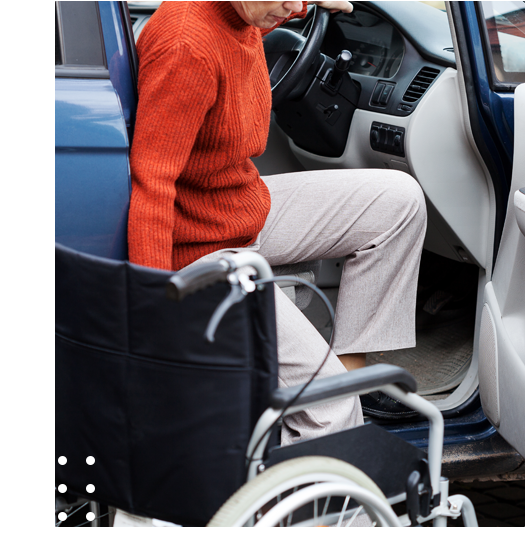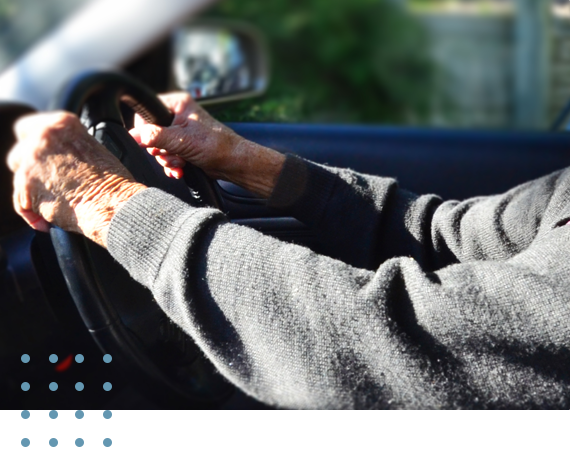Services

OT Driving Assessments
Get Your Hands On The Wheel
Driving is an important and complex skill. To slide into the driver’s seat to head out to work or meet friends becomes second nature, and we often take it for granted. However, a stroke, injury or medical condition can turn your life upside down and affect your ability to drive safely.
I’m here to help you with your OT Driving Assessment to evaluate the impact of your medical condition on your safe driving ability.
Are You A Stroke Survivor?
When you suffer a stroke, you’re not allowed to drive for one month after your stroke. If you do drive and have an accident, your car insurance may not cover you. The NSW Roads and Maritime Services (RMS) requires all stroke survivors to have an assessment of how their stroke may affect driving and this may include an OT Driving Assessment conducted by a qualified Driver Trained Occupational Therapist.
It can be daunting and frustrating to be assessed on your driving skills. However, it’s’ essential to evaluate your physical ability, vision and cognitive skills to make sure you can drive safely and confidently.


Are You An Older Person?
As you get older and start to experience certain limitations due to a physical or cognitive condition, the result may be a loss in confidence. Driving can be one of the first areas where you suddenly don’t have the confidence to get behind the wheel and navigate the traffic. Your doctor may recommend an OT Driving Assessment to determine your ability to drive safely.
It can be an anxious time when you need to be assessed on your driving skills. Having a test can evoke strong feelings of anxiety and fear. I’m here to reassure you and guide you through the process. In addition, when you’ve been driving for many years without incident, it may feel as if this type of test is unnecessary and can be frustrating.
OT Driving Assessment Process
Understanding the process can make the OT Driving Assessment a lot easier to navigate. The assessment has two components: an off-road assessment followed by an on-road assessment.
Off-Road Assessment
Two-hour interview covering your:
- Medical history
- Driving history
- Physical ability
- Vision
- Cognitive skills
- Knowledge of road rules
On-Road Assessment
One- to two-hour practical test with:
- A qualified driving instructor
- An Occupational Therapist
- In the instructor’s dual controlled car
After the two assessments, I’ll write a detailed report covering every aspect of the two-hour interview as well as an on-road analysis including your physical ability and reaction time, observation skills, speed control, planning and judgement skills. The in-depth report ends with my recommendations.
Possible Recommendations
Having an assessment or test can be stressful but knowing the possible outcomes may ease your anxiety. I will make a recommendation to the Roads and Maritime Services (RMS) in an in-depth report regarding your ability to drive and the RMS will make the final decision about licensing.
There are five possible assessment outcomes:
1. You’re assessed as safe to drive.
2. You’re assessed as safe to drive with certain restrictions which may include:
- a limited distance from home
- driving in daylight hours only
- driving an automatic vehicle only
3. You’re required to complete a series of driving lessons with a qualified driving instructor to practice certain skills.
4. You need car modifications followed by lessons to practice with the modifications, a possible OT reassessment, and a disability driving test.
5. You’re assessed as not safe to drive because of your medical condition, and your licence will be suspended or cancelled.


Pricing
Transparency is key when it comes to pricing because nobody likes surprises. The cost for the OT Driving Assessment includes both the off-road and on-road assessment as well as the comprehensive report including recommendations. Please get in contact for a quote for your OT Driving Assessment.
You’ll have to pay the driving instructor separately. You may be eligible for a rebate from your private health insurer.
